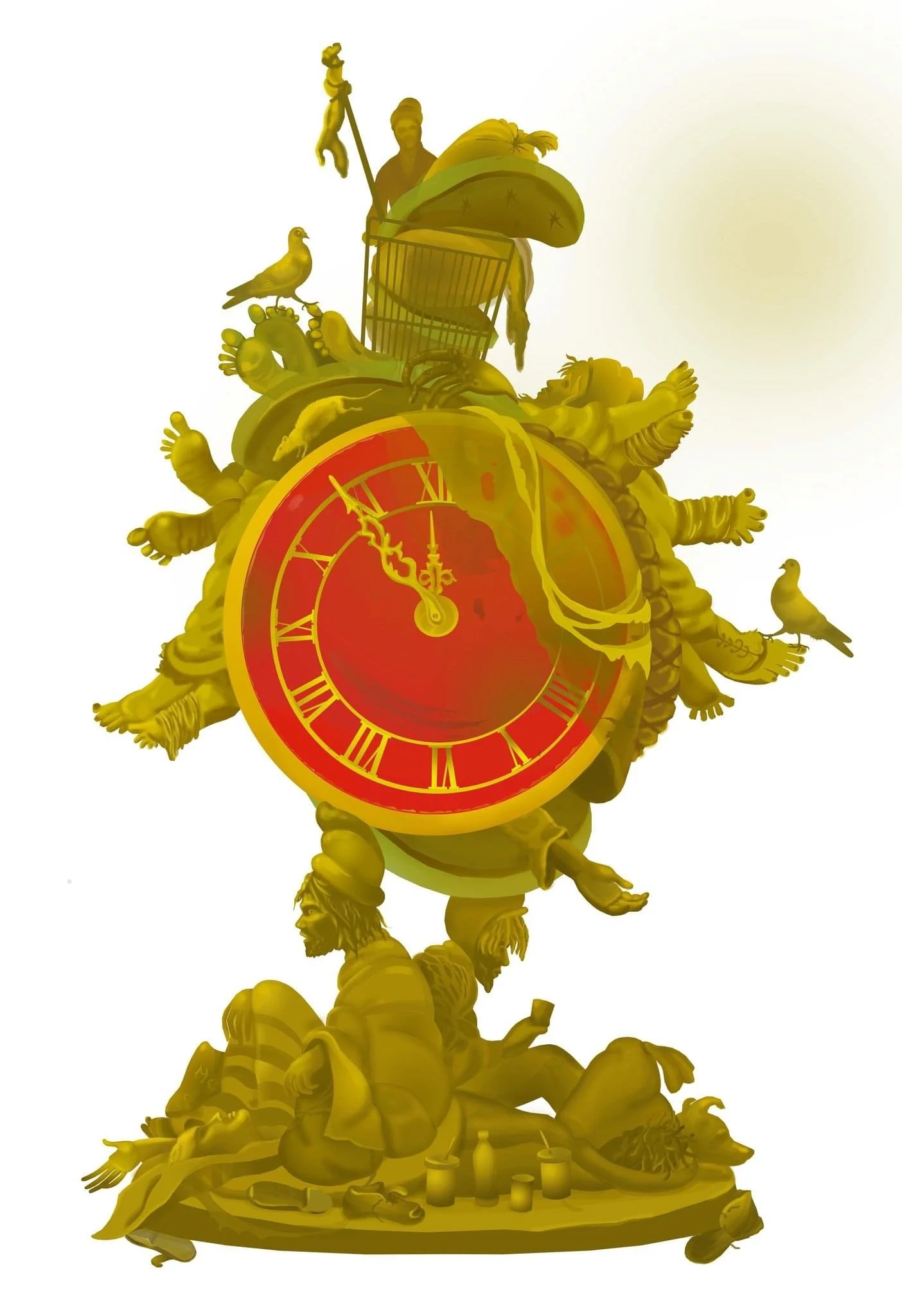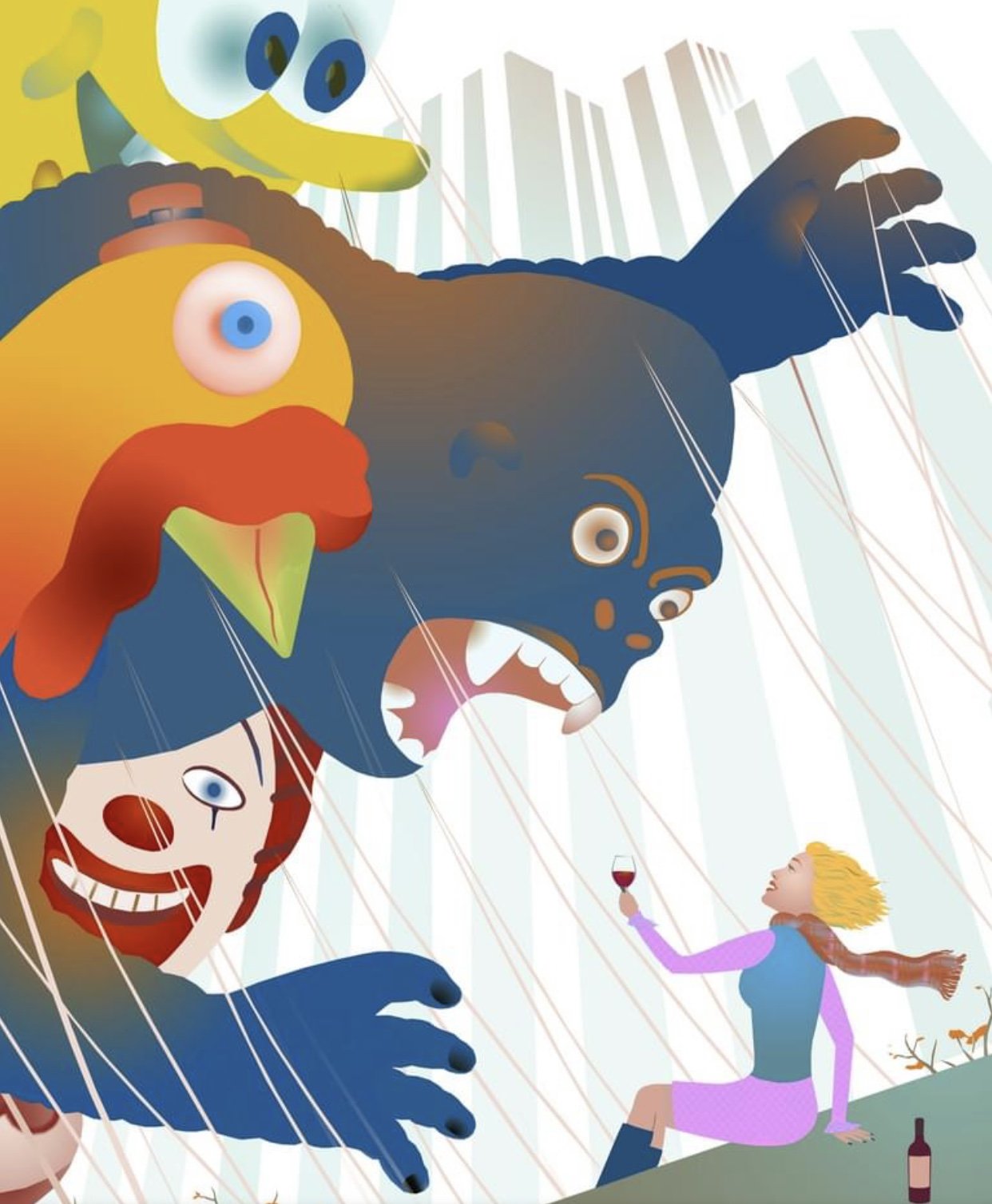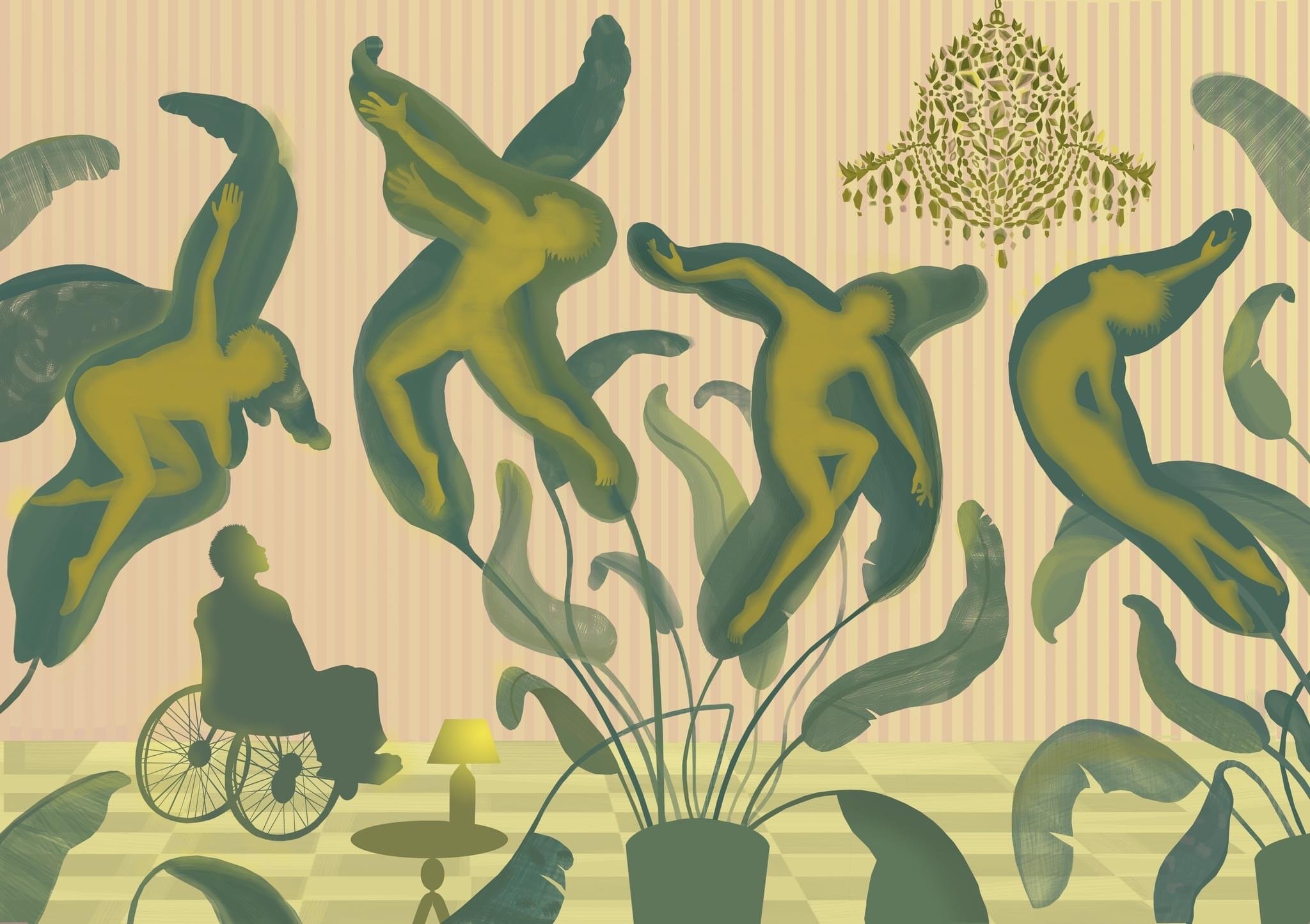Thank you Wall Street Journal for the opportunity to draw girlfriends drinking coffee in the park( my idea of the perfect pastime), squirrels and winter fun.
The Bowery Clock
As I was recently passing the corner of Bowery and Bleecker streets, I looked around and saw it- “The Bowery Clock.”
“The Bowery Clock”, is a personal piece, dedicated to homeless dwellers of New York.
Fall
Personal piece inspired by autumn.
See You All At The Parade.
Card invitation to Macy’s Thanksgiving Day Parade.
Daily Art For The Heart @yvetta_fedorova
Here are drops of wisdom delivered to you
via Eleanor Rooosevelt and InstaDiva.
Peeping Yvetta
Do you like to spy on your neighbors? Do you fantasize about their lives? My neighbor from the building across the street lives on the third floor and I can see him at night sitting in his wheelchair staring at his banana plants. Renato, my super once told me he was a famous dancer and choreographer. When I bump into him on the street we make eye contact and he smiles. He has no idea that I am watching him closely. Maybe, one day soon I will build up enough courage to talk to him. Then, you will see me, sitting and chatting with him in his banana forest. Are you a peeping Tom, a voyeur, a beholder? Do you have neighbors you fantasize about? Please tell us your story.
“A Second Chance at Sisterhood”
When the tragedy strikes, we are often coping with loss by infinitely trying to recreate the event in our minds, imagining how we could change or avoid the course of the horrible events or how we could have been better and kinder to the people we lost. We are hopelessly praying for the second chance. In the latest NYTimes TIES essay, author Jamila Osman writes: "Grief is a profound teacher, but it is anguish long before it is enlightenment. I am better for the things I have learned, and I have my sisters to thank for the most important education of my life: Ayan, my first teacher, and Idil, my second chance."
“My Stepson, the Owl and Me”
Do you invent symbolic meanings and share good luck signs with people you want to create a special connection? When I was little, on Sunday afternoons me and my mother, whom I rarely saw during the week, got into a habit of searching for a brown spotted yellow giraffe in our very beautiful but rather grey and dreary city. Excited, we walked for hours all over St.Petersburg and often when all the hope was about to fail us we saw his long glorious neck, reflecting the gold of the setting sun. This vision strengthened our bond and helped me to cope with the lonely and infinite days of my uneventful early childhood.
In this week’s TIES story the author Nicole Jankovski writes: “Maybe the owl was a gift we gave to each other, until my stepson and I figured out how to be something more than strangers in a car, cemented together by marriage."" The owl became a beacon of hope: a kindred spirit, with feathers, to narrow the valley between us. Without the owl, we were just two strangers, brought together in the shadow of divorce."
“Claiming the History in Family Names”
Could we belong to this country even if many of us have tongue twisting, alien names we are too proud to change? After being tired of constantly correcting confused strangers I gave up the proper accent to the first syllable of my last name together with the proud russian style "a" at the end of my french name long time ago. Now I often introduce myself as "Yvette Fedo'rova" even though the sound of this surrogate name makes me cringe and laugh.
In this week's NYTimes TIES essay, Raffi Joe Wartanian writes:
"My immigrant father thought adopting an American name was a prudent measure to avoid mispronunciations. To me it felt like admitting defeat."
“Seeing My Heritage Through My Grandmother’s Eyes.”
Do you know the life stories of your grandparents?
I was lucky to be raised by my “dedooshka” and “babooshka” and spent my childhood listening to the epic sagas of their childhoods in a war torn Russia, their life adventures, their survival. These stories unleashed my imagination and creativity and helped me to navigate my own life path. In this week’s TIES essay, Isabel Guarco writes: “It is not easy to forget roots that have been planted in faraway places. They linger, in memories, traditions, and in stories that mold an equivocal identity, a curiosity, and a desire to know more about who you are.”
“Carrying the Ghosts of Lives Unlived.”
Do you feel grateful for the life you already have or you are trying to imagine other destinies?
"There are hinge points in time when life could be one thing, or another."
In this week's TIES column the author Kate Hope Day writes:
"When I think of this, the memory of that hot, bright day in Rome goes cold. I shiver a little. The idea of a third child fades in my mind, and I feel grateful for what I already have. So grateful that this big, messy, joyous life isn’t a ghost life but mine."
“Against Romance: An Un-Valentine.”
As the Valentine's day is upon us a question comes to mind: "Are we supposed to subject our relationships to some recipe for permanent swoon and are made to believe we are failing if we just live in reality."
In the latest TIES assay, Judith Hertog writes about her partner: "I know him well enough now that I can say with some certainty that this is not a fleeting infatuation. I love him, not only because I know him better than any other person in the world, but also because I’ve learned from him to distrust romanticism, and above all, because it would never occur to him to ever again give me a Valentine."
Celluloid Antihero: How I Found My Father in the Movies.
“Celluloid Antihero: How I Found My Father in the Movies.”
I connected with my grandpa through our love for Fellini movies, with my grandma through our adoration of Lubov Orlova’s comedies, with my mom when she took me to see the Antonioni’s Red Dessert at the first Italian Film festival in St Petersburg, when I was 16 and with my dad through our life lasting addiction of Tove Jahnson’s Moomintrols serious of animated books.
In this week’s TIES column I illustrated, Jere Hester writes about his father: “We could never agree on much. But in the winter of 1974, a 42-year-old man and his 7-year-old son left The Fortway equally convinced that the bean-fueled campfire scene from “Blazing Saddles” ranked as the funniest sequence in movie history.”
“Raising Children Without the Concept of Sin.”
Do you raise your children spiritual and what does it mean? At the end of the day being good has to come from the heart not out of the fear of punishment. In Julia's Scheeres essay I illustrated for this week's TIES column, she writes: "My religious fundamentalist childhood was built around the fear of sin. My daughter doesn't even know the word. She did have a moral code — one she followed not from obligation, but from her own desire to make the world a better place.
“In the Country of Motherhood, Finding My Own Path.”
Do you consider yourself a natural born mother or did you feel "totally devoid of any maternal intuition"? No matter how each of us begin our motherhood journey we all have to find our own path.
In the story by Olga Mecking I illustrated for this week's TIES column, she writes: "The Japanese have Kitsungi, a method of repairing broken pottery with gold, making it even more valuable after it has been broken. Some of the parenting books I read told me that I should similarly welcome the shattering of myself, and that I was made better because I was now a mother. I disagreed. I liked myself just as I was before I had children. While other mothers were taking pride in their new broken and repaired forms, I was on my hands and knees, still looking for pieces of myself."
“Myself, by Any Other Name.”
Do you feel connected to and empowered by your last name? Was it important to you (if you are a female) to keep your father’s last name even after the marriage(s)? I certainly connect with my father’s name who passed away from lung cancer the month I came to America. In the powerful essay I got to illustrate for the TIES column this week, Pari Berk, the writer, felt a need to reconnect with her maiden name to help her fight a terrible disease.
“I Could Face My Own Mortality, but My Son’s Was Another Story.”
Are you afraid to talk about death? In our culture and time it is not fashionable for us to linger on death. Extreme measures are taken to extend life. Tropes and platitudes abound: “Think positive.” See cancer as a “gift.” But I had made peace with my own mortality. Now I found that learning to live alongside even the mortality of a child I loved gave me a kind of strength that denialism could not, because it was a relief to acknowledge something that felt more true."
My latest illustration for the TIES column of the NYTimes is for the essay about one mother who could face her own mortality, but her son’s was another story:
“I Dreaded Winter Until My Newborn Taught Me to Embrace It.”
Does winter with it's long dark nights make you feel sad and eerie?
My latest illustration for the TIES column of the NYTimes
is for an essay about a writer, who had a deep dislike for winter. It changed when she became a mother:
"Those long, dark, cold winter nights I had feared more than childbirth itself became something I hadn’t known a night could be: a haven. A shelter."
“Christmas Fudge and Misremembered Snow Cream.”
Do you have your favorite childhood recepy that your family still uses for Christmas? "When it comes to memories, we each cling to our version like honey on a measuring spoon."My latest illustration for the TIES column of the NYTimes:
“How Pavarotti Brokered a Bond With My Dad.”
Are you a music lover? Can you share your love of melodies with your family members? In my latest illustration for the TIES column at the New York Times one gay kid loved Broadway show tunes. His blue-collar dad loved fishing and baseball. “O Holy Night” briefly erased the distance between them.






















